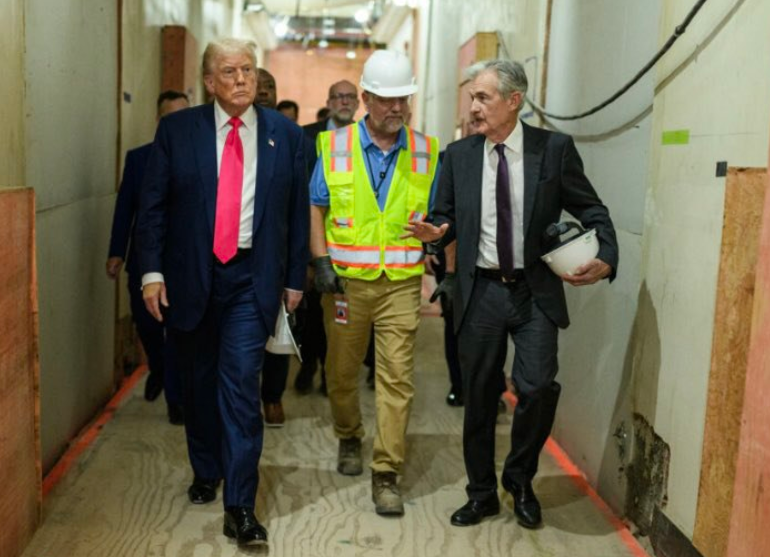Former Trump economic adviser Stephen Moore is calling for Federal Reserve Chair Jerome Powell to resign, accusing him of being the “most political Fed Chairman” in modern history. Moore criticized Powell’s handling of both inflation and interest rates, arguing that his decisions have harmed the economy under both the Trump and Biden administrations. The comments come amid mounting pressure on the Fed, following weak job numbers and recent high-level resignations.
It’s Time To Resign:Former Trump advisor blasts Powell
Washington is buzzing, and not just from the summer heat. The latest jobs report, Federal Reserve actions—or lack thereof—and growing scrutiny over the Bureau of Labor Statistics have become central topics in the economic and political discourse. Joining the conversation is Stephen Moore, cofounder of the Committee to Unleash Prosperity and former senior economic adviser to President Donald Trump during his first term. In a recent interview, Moore offered his perspective on a number of pressing issues shaping the nation’s economic direction.
The job numbers released this week were underwhelming by any measure. Economists had predicted job growth of about 110,000, but the actual number came in at just 73,000. That’s a sharp miss even against already modest expectations. Meanwhile, Federal Reserve Chair Jerome Powell chose not to lower interest rates, maintaining the current levels despite mounting evidence of economic slowing. According to Moore, Powell’s leadership has been lacking at key moments.
He pointed to Powell’s policies as having contributed to inflation reaching a peak of 9.1% under Biden, and also being too restrictive during Trump’s presidency—moves that nearly triggered a recession.
Moore also focused on a critical yet less discussed element of the jobs data: the repeated, large-scale revisions. He emphasized that the true story of this report lies in those revisions, which, he argued, indicate previous overstatements in job creation. Moore didn’t hold back when discussing the leadership at the Bureau of Labor Statistics (BLS). Without directly accusing anyone of political motivations, he expressed skepticism about the significant errors in jobs data under the Biden administration.
Referencing Erika McEntarfer, the current head of BLS and a Biden appointee, Moore said the scale of the revisions—818,000 in March 2024 and 112,000 in the pre-election period—reflects serious mismanagement. Former President Trump reportedly called for McEntarfer’s dismissal, a sentiment Moore echoed, citing incompetence rather than political bias.
According to Moore’s own sources within BLS, there’s a strong chance that job creation under Biden may be further downgraded by as much as 500,000 positions, adding fuel to Republican critiques of the current administration’s economic messaging. He drew a contrast between McEntarfer and Bill Beach, a former BLS head under Trump, who was let go by the Biden administration. Moore claimed that several reforms aimed at improving data accuracy were scrapped when leadership changed.
Pressure is also building on the Federal Reserve beyond Powell himself. Fed Governor Adriana Kugler resigned recently, adding to speculation about instability or internal disagreements. Moore stopped short of claiming Powell would step down, but he didn’t rule it out either. He maintained that Powell has been too political, a contradiction to the Fed’s mission of independence. There’s ongoing legal debate about whether a president—Trump or otherwise—can fire the Fed chair, but Moore thinks resignation would be the honorable course.
Switching gears, Moore also weighed in on another cornerstone of Trump-era economic policy: tariffs. The United States is on track to generate over $200 billion in tariff revenue this year. Moore admitted he was initially skeptical, believing tariffs to be too blunt a tool for nuanced trade relationships. However, he conceded that the resulting trade agreements have been more favorable for U.S. industries, including manufacturing, agriculture, and tech. Trump’s latest push is aimed at Canada, specifically tied to fentanyl policy disagreements. For Moore, this suggests a continuation of the America First agenda, leveraging trade for broader geopolitical and economic goals.
Moore acknowledged that the early implementation of Trump’s tariffs caused disruption, especially for U.S. manufacturers that rely on imported components. He explained that production in the U.S. is often deeply integrated with global supply chains, and the sudden changes introduced what he described as “havoc.” Yet he ultimately gave credit to the strategy for producing stronger, more balanced trade deals.
In closing, Moore stated that Trump’s tough stance on trade removed what he metaphorically called the “kick me” sign from the U.S. economy. The Trump administration signaled that trade would no longer be a one-way street and that allies and competitors alike would have to engage with the U.S. on a fairer, more reciprocal basis.

In sum, Moore’s comments reflect a clear critique of current economic stewardship under President Biden while also acknowledging the complex trade-offs involved in the Trump administration’s policy decisions. From flawed job estimates to rigid monetary policy and controversial but effective trade tactics, the conversation paints a picture of an economic landscape filled with uncertainty, revision, and political stakes that only seem to grow as 2025 progresses
Disclaimer:
The views and opinions expressed in this article are those of the individuals quoted and do not necessarily reflect the official policy or position of this blog. The content is intended for informational purposes only and should not be construed as financial or political advice. Readers are encouraged to conduct their own research and consult with qualified professionals before making any decisions based on the information provided.

